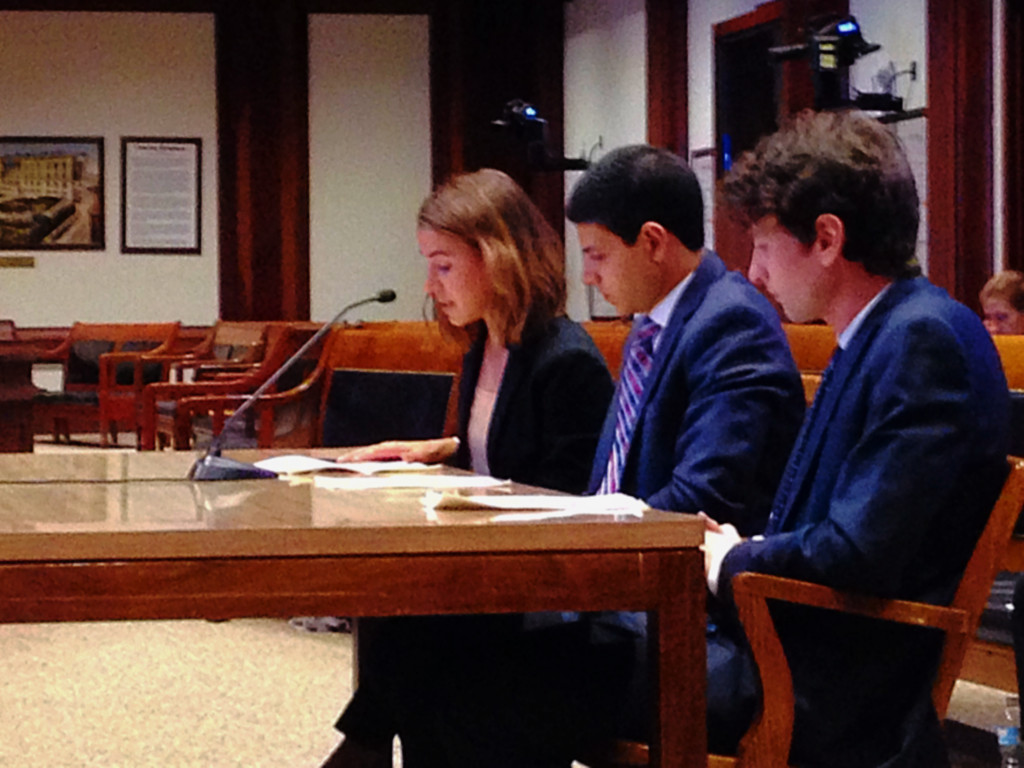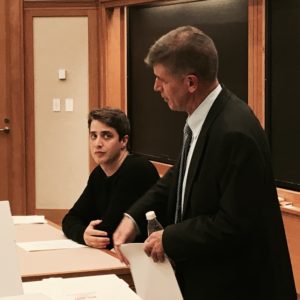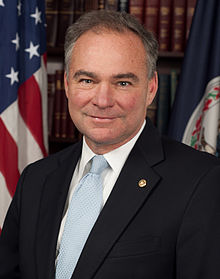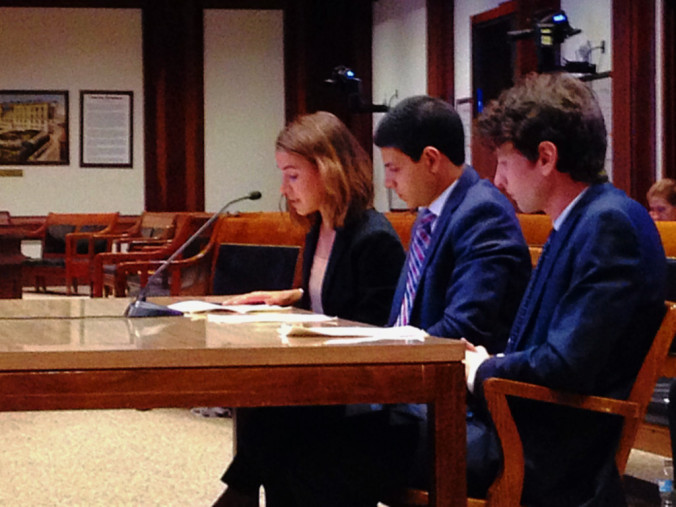
On October 14, three PLAPpers joined individuals and organizations from across the Commonwealth at the State House to testify before the Joint Committee on the Judiciary, in support of bills aimed at improving criminal justice. Despite little advance notice, a dozen PLAPpers volunteered to do research and draft written testimony for the Committee’s review, and three PLAPpers – Michael Mullan (LLM), Katherine Robinson (1L), and Eddie Nasser (1L) – appeared in person to present oral testimony on PLAP’s behalf. Dozens of bills were on the Judiciary Committee’s agenda, but PLAP focused on three issues of considerable importance to its clients.
Solitary Confinement
Michael Mullan expressed PLAP’s support for two bills: one that would require the Massachusetts Department of Correction to collect data and report on the usage of solitary confinement in state prison, and another that would substantially limit the use and duration of solitary confinement. Mr. Mullan highlighted PLAP’s unique familiarity with this issue, as PLAPpers represent state prisoners in dozens of disciplinary hearings each year, with solitary confinement always a potential sanction (and often a feature of the pre-hearing process). For serious charges, the DOC permits sentences of up to ten years in solitary confinement, making Massachusetts an outlier nationally.
Mr. Mullan described the dehumanizing effects of solitary confinement, effects which are well known and acknowledged by experts in many different fields. Being locked in a small, cramped cell, with solid doors and limited natural light, for 23 hours a day, day after day, takes a heavy toll on the inhabitant. The harm done to prisoners in solitary is also visited on the community, as most prisoners are eventually released. The transition to society, which is already difficult, is made even more so when a person has been deprived of normal stimuli or social interaction for extended periods of time.
Mr. Mullan submitted PLAP’s position that given these harms, the DOC should be reporting its usage of solitary confinement, so that it can be monitored and studied, and long-term solitary confinement should be eliminated. Mr. Mullan reminded lawmakers that solitary confinement is imposed not only on the guilty but on those merely accused of violating prison rules, with indefinite confinement for weeks or sometimes months.
Compassionate Release
Katherine Robinson urged the Judiciary Committee to report out a proposal to bring compassionate release to Massachusetts. The proposal would allow a court to release terminally ill or permanently incapacitated prisoners to a hospital, nursing home, long term care facility, or home with hospice services. Again, Massachusetts is an outlier nationally, one of only five states not to have such a law on its books.
Ms. Robinson identified the many benefits of the bill, which would move dying and incapacitated patients from prison to a more suitable setting, where the delivery of appropriate care would be less costly. Along with more efficient health care, placement outside the prison wall would reduce the burden on correctional staff, who now must protect these very vulnerable prisoners and transport them to and from every medical appointments and hospital trip.
Drawing on PLAP’s experience representing ill and elderly clients, Ms. Robinson demonstrated how prisons are ill-suited to manage these people’s needs. One PLAP client with dementia, who was wheelchair-bound and legally blind, was disciplined for shouting and flailing his arms at nursing staff when they changed his linens at 1:00 a.m. Although he was predictably disoriented, he was found guilty of assault and other charges. The Department of Correction only relented and withdrew its finding after PLAP appealed the agency’s decision to Superior Court.
Parole Reform
Eddie Nasser conveyed PLAP’s support for two bills that would modify the parole process. The first bill would increase the size of the Board from seven to nine members, and it would require that at least three Board members be drawn from the fields of psychiatry, psychology, sociology, or social work. Mr. Nasser highlighted significant delays in the Board’s decisionmaking in recent years, which could be alleviated by an expanded Board. A required complement of mental health or sociology professionals, meanwhile, would be an appropriate response to the prevalence of mental illness in this population, and such professionals would be uniquely suited to make the risk assessments required of the Board.
The second bill would make Massachusetts a presumptive parole state – one in which the presumption is that parole will be granted at the time of eligibility, unless the Board makes a specific determination that parole release would be incompatible with public safety. Mr. Nasser argued that a presumptive parole scheme would make the convict’s prison record and conduct the main focus of a parole hearing, and it would prevent an undue emphasis on the crime. Moreover, it would make the parole process more objective and predictable, which would benefit all the parties.
Committee members asked several questions of the PLAPpers without tipping their hand as to their position on these bills. Over the next few months, PLAP will work with other organizations to encourage the Judiciary Committee to report these bills out favorably.




